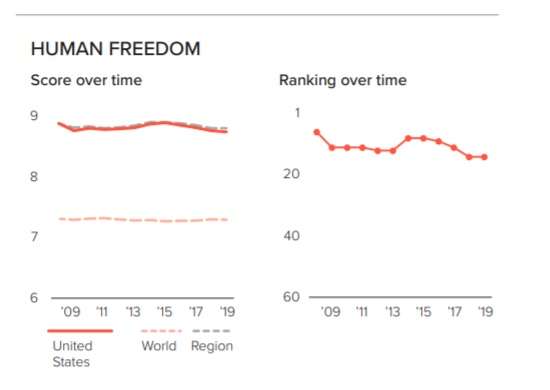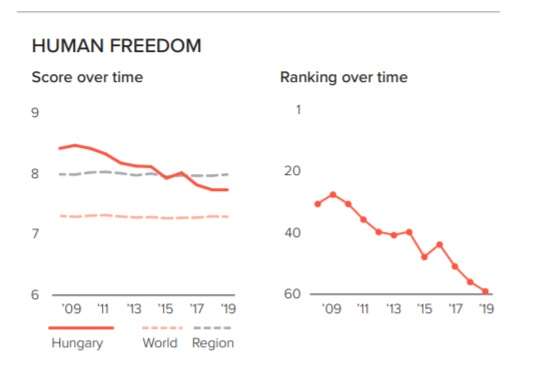According to a recent analysis, 83 percent of the world's population is less free now than in 2008, and the gap between the most and least free countries is widening.
The great majority of the world's population is less free now than it was a decade ago, and all citizens of the world's ten most populous countries have seen their liberties erode during the same time period.
That's the most worrying takeaway from the annual Human Freedom Index, an annual report produced by the libertarian Cato Institute and the Frasier Institute, a Canadian think tank. The United States is ranked 15th most free country in the world out of 156 jurisdictions studied in this year's assessment, which was announced on Thursday.
Switzerland, New Zealand, Denmark, Estonia, and Ireland are the top five most free countries. The rankings, which take into consideration 82 measures of economic, personal, and civil liberties, place Egypt, Sudan, Yemen, Venezuela, and Syria at the bottom.
Somewhere in the globe must be regarded the most free, yet worldwide trends are pointing in the wrong direction. The authors of this year's study observe that since the first report was released in 2008, roughly 83 percent of the world's population has seen their freedom erode. The divide between the most and least free countries has expanded as well, with almost 40% of the world's population now living in countries that score in the bottom 20% for total freedom.
"The decline in fundamental rights represents a disturbing trend that was occurring even before the world experienced the COVID-19 pandemic and its social and political effects," writes Ian Vásquez, vice president of international studies at Cato. "The areas that saw the largest falls globally were freedom of expression, freedom of religion, and freedom of association, assembly, and civil society. Although our report does not yet pick up freedom data from 2020, we fully expect to see a deterioration in global freedom indicators in future reports."
According to the latest research, freedom in the United States is declining in both absolute and relative terms. The United States was rated seventh in the world in 2008, but it has slowly declined since then, albeit it remains much above of the global average:

But the decline in freedom in the United States is nothing compared to what has happened in Hungary—a country now routinely (and wrongly) held up by segments of the nationalist right as an example that America should seek to emulate. Hungary ranks 59th in this year's index, down from a high of 29th in 2009. Recent efforts by strongman dictator Viktor Orbán to curtail freedom of expression and erode the rule of law are clearly reflected in the ratings, with Hungary now ranking considerably less free than its European neighbors:

As Reason noted last month, the twin threats of political populism and the COVID-19 pandemic have triggered an erosion in democratic values across the globe. International Institute for Democracy and Electoral Assistance, a nonprofit based in Sweden that has been tracking democracies around the globe since 1975, warns in a new report that the number of countries that are becoming "more authoritarian" by the group's calculus is three times the number of countries that are moving toward democracy. This year marks the sixth year in a row that the trend has been in that way.
While freedom and democracy are not always synonymous—and can often be at odds—democratic governments have done a better job defending and fostering freedom than authoritarian regimes throughout history. Both numbers now appear to be dropping in lockstep.













